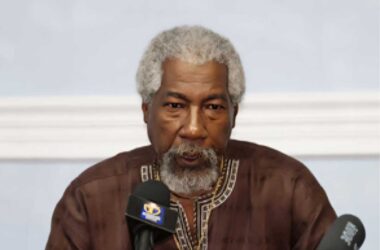
There’s no doubt another external military intervention in Haiti will only cost more lives, irrespective of results.
Its history, partly observed today (August 23) as the UN-Designated International Day in Remembrance and Condemnation of the Trans-Atlantic Slave Trade, is littered with the foreign military interventions that immediately followed the triumph of the Revolution and establishment of the world’s first Black Republic in 1804.
These included separate and joint interventions, over time, by European and North American troops, leading to Haiti’s forced payment of reparations by way of 90 million gold francs to French plantation owners, that took over a century to pay-up.
‘Gang Violence’ is only the latest of a continuing deadly series of internal clashes that have haunted Haiti since the military and police were defanged by corruption and infiltration and the type of external subversive political and military interventions that fueled the fires that led to the brutal assassination of President Jouvenel Moise by a foreign-led squad of mercenaries, in the presence of his wife.
External interventions also included assignment of United Nations (UN)-led multinational Peace Keeping Forces (PKFs) that were supposed to keep the peace but lost the people’s trust after they broke with usual protocols and started engaging in extra-curricula activities including allegations and investigations involving sexual abuse by international aid agencies.
The UN’s PKF was blamed for introducing a deadly cholera virus that led to deaths of thousands and affecting thousands of families, but instead of coming to the assistance of the victims by mobilizing international capital to meet the costs of attending to victims, the UN invoked diplomatic immunity to escape its responsibility to the people of the most-populous Caribbean Community (CARICOM) member-state.
The UN earned a bad reputation of betrayal and mistrust among Haitians since the cholera epidemic introduced by UN soldiers from Nepal, but it’s now seeking to regain lost trust in Haiti by advocating non-UN external intervention — led by Haiti’s CARICOM neighbours and African family, but fully-supported by the UN Security Council, to open the way for maximum support for such an intervention by nations (like Canada, France, USA, UK, etc.) willing to provide the arms.
The approach looks like having CARICOM and Kenyan ‘troops’ lead the way – like in the Grenada invasion of October 1983 – with overwhelming back-up by the real military might of the US’ troops, ships and aircraft.
This time around, however, with the historical inability of external forces to keep peace in Haiti — where the gangs outgun what’s left of the local police and army – it’s clear the approach here is also to use a proxy war, with more black (Caribbean and African) than white American or European troops.
Same with Niger, where the West is depending on the Economic Community of West African States (ECOWAS) to take their fight to the new military-led transition government on their behalf, with multinational African troops fighting an African army on their behalf – and (like in Ukraine) supplying the weapons.
After so-far spending over US $100 Billion in Ukraine, the West is studiously avoiding directly engaging Russia and both sides are playing Russian Roulette with conscripted forces selectively described as ‘international fighters’, ‘independent brigades’ or ‘mercenaries’…
However, as in Ukraine and Niger, what’s needed in Haiti is peace, not more war; but those fanning the flames of external intervention continue to peddle the impossible solution of bringing peace through fighting, of ending wars by fighting more – and harder.
This historical approach of treating Haiti as a permanent failed state that can never find its own solutions from within continues to be manifested in the frequency and volume of calls for and emphases on external military intervention as the only way out for Haiti.
As in Grenada, Ukraine and Niger, all those advocating and promoting external military intervention are interested in is preserving or restoring the disturbed geopolitical and security status quo, to gain strategic continental military advantages, and/or to preserve access to natural resources important to Europe and North America.
But Haiti has seen enough of its blood shed by violence and every previous external intervention has confirmed, by way of fruitless positive results, that violence – whether White-on-Black or Black-on-Black – is never a permanent solution to any festering homegrown problem, even if fertilized by external applications.
With no effective legal government in place, no elected president and no national judicial, legal, security or public entity working effectively, exacerbation of all-round violence and the social disorder that will come with and follow it all, is sure to bring more hurt and harm than help and heal Haiti.
Like everywhere else, the world’s richest nations, while opting out of leading the intervention they recommend for Haiti, are also leaving on the table the usual clear and distinct possibility of direct intervention, in the usual name of ‘rescuing nationals’ or ‘protecting national interests’…
However, never mind earlier expressions of support by some CARICOM member-states, it’s important to remind today’s leaders of the lingering after-effects of Caribbean participation in the Grenada invasion by provision of a fig leaf for a US invasion in the name of an invited ‘rescue mission’.
To preserve its Monroe Doctrine approach to treating the Caribbean as part of ‘America’s Backyard’, the US ensured creation of a Regional Security System (RSS), trained largely by the US Armed Forces South Command, since the Grenada invasion almost 40 years ago.
Washington will definitely want to see the RSS replay the role assigned by the Organization of Eastern Caribbean States (OECS) back then, in providing the intervention invitations and committing their police forces to simply being like laces for foreign jackboots.
However, CARICOM must learn from history and not again lead the way with violent approaches to peace, but instead insist on allowing Haiti (and its Caribbean neighbours) to continue working harder on pacifist approaches to starting an end to its present troubles.
Haiti has bled much-too-much.
Not again!











